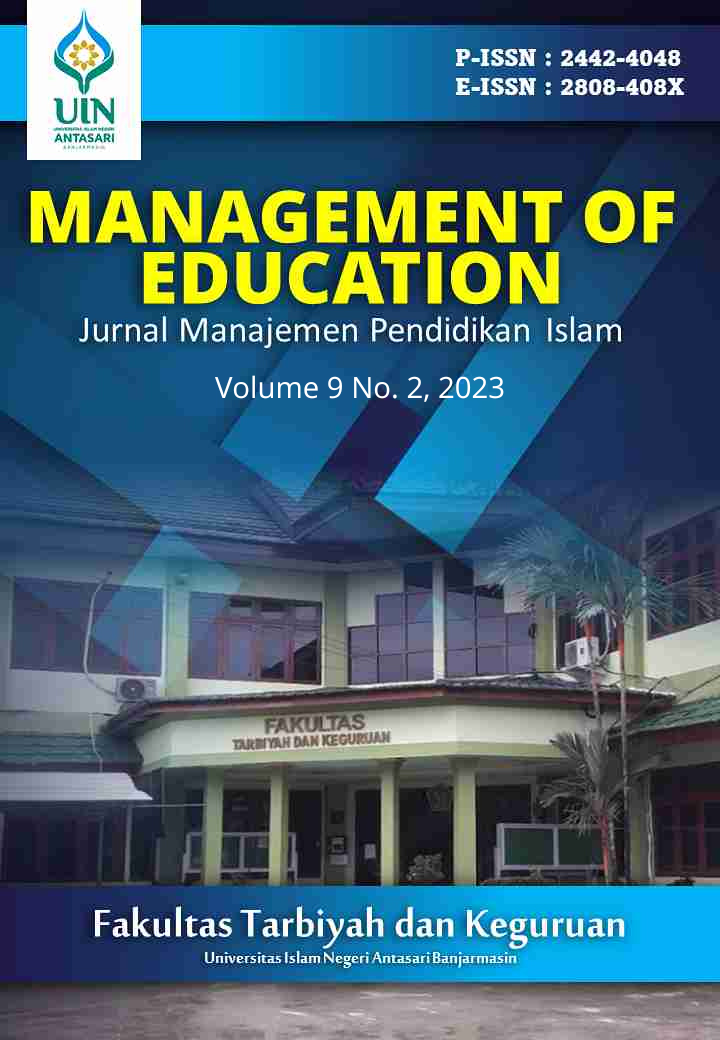PENGEMBANGAN INSTRUMEN KETERBUKAAN DIRI BERBASIS MEDIA PERMAINAN DAM QUIZ PADA PESERTA DIDIK TINGKAT SMP
DOI:
https://doi.org/10.18592/moe.v9i2.10086Keywords:
Self-disclosure, Instrument Development, Dam QuizAbstract
Self-disclosure is needed to build interpersonal relationships with other individuals. In the process of adaptation to the social environment, a person must be willing to open up so that his presence can be accepted in his environment. This study aims to develop and validate self-disclosure instruments for junior high school students. This development research was carried out at Al Huda Lamongan Islamic Middle School. The method used in this research is R&D. The trial was carried out on 47 students using saturated sampling techniques. Aspects of self-disclosure that are measured in the instrument include: emotional state, interpersonal relationships, personal, taste, sex, thoughts, religion, problems, and education. The results of this data analysis mean that the self-disclosure instrument for junior high school students can be declared valid and reliable, so that it can be used by counseling teachers and counseling researchers to measure the level of self-disclosure of students.References
Anitasari dkk . (2021). Pengaruh Efikasi Diri terhadap Perilaku Menyontek Siswa Sekolah Dasar selama Pembelajaran Daring. Jurnal Penelitian Ilmu Pendidikan, 14 (1), 2021 – 83.
Gregory, R. J. (2013). Psychological testing: History, principles and applications
(7th edition). Wheaton College: Pearson.
Hadaina, N., & Astawan, I. G. (2021). Instrumen Kemampuan Kerjasama Anak Kelompok B Taman. 4(1), 8–12.
Magno, Carlo., Cuason, Sherwin., Figueroa, Christine. (2008) The Development
of the Self-disclosure - De La Salle University-Manila
Muljono, P. Penyusunan dan Pengembangan Instrumen Penelitian. P. D. A. N. (2002). Instrumen penelitian.
Pohan, R. A. (2023). Pengembangan dan Validasi Instrumen Kepercayaan Diri Siswa dalam Merespon. 6(1), 47–54.
Puspitasari, H., Husna, M. A., & Ulummudin, I. K. (2021). Pengembangan Media Dam-daman dalam Mata Pelajaran Fiqih Materi Haji Kelas V MI Al Muslimiyah Randublatung Blora. At-Tuhfah: Jurnal Studi Keislaman, 10(1), 45-59.
Rasmawan, R. (2021). Pengembangan Instrumen Microteaching Berdasarkan Pembelajaran Abad Ke-21. 19(1), 31–45. https://doi.org/10.31571/edukasi.v19i1.2348
Sari, D. Y., & R, D. S. (2016). Gambaran Keterbukaan Diri (Studi Deskriptif pada siswa kelas VIII di SMP Negeri 48 Jakarta) Abstrak. 5(1).
Syamsuryadin, S., & Wahyuniati, C. F. S. (2017). Tingkat Pengetahuan Pelatih Bola Voli Tentang Program Latihan Mental Di Kabupaten Sleman Yogyakarta. Jorpres (Jurnal Olahraga Prestasi), 13(1), 53–59.
Widi, Ristya. (2011). Uji Validitas dan Reliabilitas dalam Penelitian Epidemiologi Kedokteran Gigi. Stomatognatic (J.K.G. Unej) Vol. 8 No. 1 2011 : 27-34. Universitas Jember.
Zulamri, Z. (2019). Pengaruh Layanan Konseling Individual Terhadap Keterbukaan Diri (Self Disclosure) Remaja Di Lembaga Pembinaan Khusus Anak Klas II B Pekanbaru. At-Taujih : Bimbingan Dan Konseling Islam, 2(2), 19.
Downloads
Published
How to Cite
Issue
Section
License
Authors who publish with this journal agree to the following terms:
- Authors retain copyright and grant the journal right of first publication with the work simultaneously licensed under a Creative Commons Attribution 4.0 International that allows others to share the work with an acknowledgement of the work's authorship and initial publication in this journal.
- Authors are able to enter into separate, additional contractual arrangements for the non-exclusive distribution of the journal's published version of the work (e.g., post it to an institutional repository or publish it in a book), with an acknowledgement of its initial publication in this journal.
- Authors are permitted and encouraged to post their work online (e.g., in institutional repositories or on their website) prior to and during the submission process, as it can lead to productive exchanges, as well as earlier and greater citation of published work.









 This work is licensed under a
This work is licensed under a 